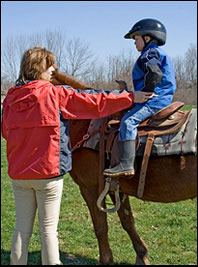Our online course: Animal Assisted Psychotherapy and Counseling: Canine, Feline, & Equine Therapy
is offered for 8 CE Credit Hours
Do you dream of horses? Flying horses, wooden horses, dark horses, white horses, wild horses?
Our relationship with horses is timeless. They figure prominently in our oral and written traditions: myths, legends, folklore, art, religious symbols and rituals abound. Horses have been our indispensable partners, from leading the charge into battle, to helping farmers work their fields, to transportation, entertainment and lots more in between. Today we are recognizing and exploring their contribution to our psychological well-being. These majestic and powerful creatures are entering into relationships with psychotherapists and their clients in real form, not just in stories and dreams. Therapists are taking their clients into arenas and pastures to learn from the world of the horse.
Equine-Assisted and Equine Facilitated therapies are becoming more popular.
What is it all about? …and why the Horse?

- Horses are prey animals, so every part of them is attuned to the here and now, paying acute attention to their environment. They must be able to respond immediately and effectively in order to survive. As a result, horses are aware and focused. They respond to nuances in human behavior so subtle that often people themselves miss them.
- Horses are social animals and live in highly structured communities. Being alone means death to a horse. They need each other. Their roles within the herd are clearly defined, and although there are clear hierarchies, even the most submissive horse plays an important role in the overall safety and survival of the herd. Horses are motivated to try to understand and relate to humans, as well.
- However, a horse cannot be forced to engage with people on this close emotional level. Horses have clear, complex communication systems. In order to earn the trust of a horse, a person’s communication must be clear. The more aware of the horse a person can be, the more the horse will trust and tune in to the person. Horses are sentient beings with distinct personalities and moods. Their emotions are clear: there is no wondering what a horse is feeling. Horses trust people who are clear, honest, kind and present.
Equine-Assisted Therapy has been shown to effectively:
- Manage stress
- Increase confidence
- Improve communication skills
- Reduce anxiety and depression
- Decrease loneliness and increase a sense of meaning
- Support autistic people
- Treat combat veterans, youth-at-risk, victims of violence and abuse, and those with psychotic disorders, behavioral difficulties, schizophrenia, attention deficit hyperactivity disorder, receptive or expressive language disorders, and personality disorders
- And more